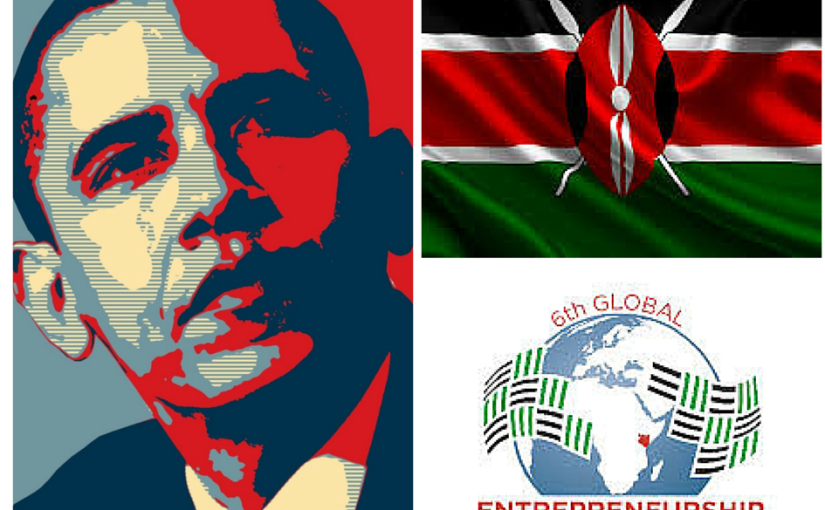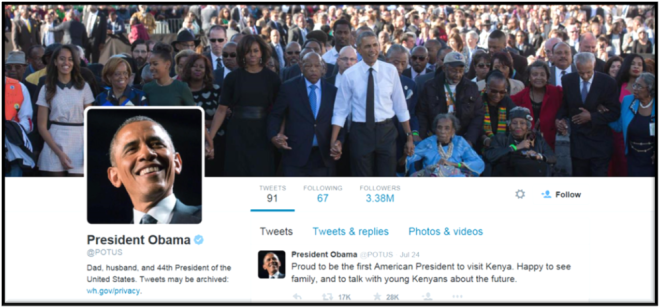President Barack Obama visited Kenya for the first Global Entrepreneurship Summit (2015) in sub-Saharan Africa; this trip held particular significance as it was seen as Obama’s homecoming, dubbed #ObamaReturns #ObamaInKenya. The son of a former Kenyan goat herder came back as one of the most powerful men in the world.
Obama delivered various speeches, including one where he mentioned Kenya’s anti-gay laws which didn’t go down too well with his Kenyan counterpart, Uhuru Kenyatta.
Obama: … “A law-abiding citizen who is going about their business, and working at a job and obeying the traffic signs and not harming anybody, the idea they will be treated differently or abused because of who they love is wrong, full stop.”
Kenyatta: “There are some things that we must admit we don’t share. It’s very difficult for us to impose on people that which they themselves do not accept.”
Kenyatta went onto say that although America an Kenya share certain values, Kenyans are not bothered about gay rights, but rather issues such as healthcare which affect their daily lives.
I think Obama would have expected this type of response. Since the U.S. Supreme Court’s ruling that their Constitution renders gay marriage legal across the whole of the country, Obama’s stance on gay rights has garnered global attention. Visiting what has been labelled the most homophobic continent in the world, and specifically Kenya where such activities are illegal, Obama would have been judged by the rest of the international community if he didn’t speak on the issue. However, I think it’s fallen on deaf (Kenyan) ears; unlike in America, in a country fighting infant mortality rates, maternal deaths, poor sanitation and other related issues, gay rights will not feature high on the domestic political agenda. After all it was only this year that U.S. Supreme Court made their ruling, which wasn’t really top of the agenda when America was going through the recession.

Although this short trip was designed to focus on the economic relationship between Africa (specifically Kenya; apparently the largest economy in East Africa), many were also interested to see the dynamics between Obama and his family.

After the festivities, the business of African entrepreneurship was back on the agenda with a particular focus on the importance of young and female entrepreneurs in Kenya and across the continent, as women are more likely to reinvest back into their families and local communities. To facilitate this, there was a pledge from Obama to opening three Women Entrepreneurial Centres in Zambia, Kenya and Mali.
In another speech at Moi International Sports Centre in Nairobi, Obama condemned the oppression and physical abuse of women, including genital mutilation. Overall this whistle-stop trip to Kenya was a positive one. Obama’s rhetoric on the strides Africa has made to pull herself out of poverty coming to fruition reverberated around the stadium. However, familiar cautions were thrown into the mix: corruption and tribal divisions, which have been obstacles to African development for decades.
After leaving his father’s birth place, President Obama landed in Ethiopia today (Sunday 26th July), where he will again be the first US president to visit the country, and address the 54-member African Union (AU), at its £127m Chinese funded headquarters, on 28th July 2015. According to a report by Ernst and Young (EY), Ethiopia is predicted to be third largest economy in the Sub-Saharan Africa by 2017. Zemedneh Negatu, Managing Partner at EY Ethiopia, mentioned that Ethiopia accounted for a fifth of Foreign direct investment (FDI) jobs in Africa during 2014.
Some may question what Obama has actually done for Africa, especially being (of direct traceable African descent) the first African-American elected president of the U.S. on 5th November 2008.
To be blunt, not much.
Bill Clinton introduced the African Growth and Opportunity Act (AGOA), and the George Bush administration increased aid spending targeted at HIV and AIDS initiatives. However, this Global Entrepreneurship Summit is a step in a better direction; to really rise from the ashes of poverty Africa needs transparent and accountable institutions and for Africans to develop their own businesses. Championing entrepreneurship and access to global funding opportunities is the way to go.

It’s important to remember Barack Obama is the president of the U.S. therefore domestic issues such as the recession and terrorism (he was able to track down and kill Osama Bin Laden) will take precedence over foreign policy. Despite this, the hopes of many Africans and those of African descent in the diaspora rested on his shoulders. The fact that a black / mixed-race man (which ever term you prefer), could be democratically elected in a country with one of the most brutal legacies of racial hatred, filled black people around the world with hope. As Obama is still just a human being, there are some burdens which one cannot carry alone.
The Sky’s the limit.

Despite not living up to all the expectations placed on this man born in sunny Hawaii, Barack Obama has inspired hope in many of his fellow Kenyans, who regard him as one of their own, and people of African descent around the world. Sometimes, all you need to do is cause a ripple in the water…and the rest (they say) is history.
Barack Hussein Obama II is An African-American ‘Affecter’
Affect (verb): Have an effect on; make a difference to or influence something.
Ad+s Diaspora:
An African affect with a colourful perspective
Twitter: @adsdiaspora
Instagram:@ads_diaspora


